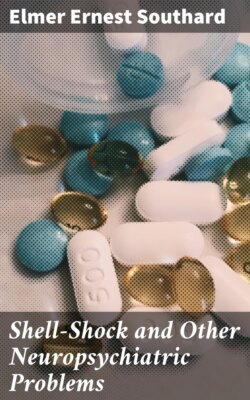Читать книгу Shell-Shock and Other Neuropsychiatric Problems - Elmer Ernest Southard - Страница 58
На сайте Литреса книга снята с продажи.
ОглавлениеOniric delirium (Régis) in a somewhat feebleminded Esthonian.
Case 50. (Soukhanoff, November, 1915.)
An Esthonian, 21, a soldier in a reserve regiment, came to a psychiatric section towards the close of 1914. He was negativistic, mumbling, restless, fugacious; later more tranquil. One day he entered the physician’s office, walking up and down, mute, looking at articles and attempting to take them away.
February 21, 1915, he was evacuated to the Notre Dame Hospital for the insane at Petrograd—a tall, healthy, agitated-looking youth with a rapid pulse. He explained in poor Russian how he was now among Germans and feared that they were going to hurt him. At first in the hospital he was seclusive and morose. March 9 he became excited, and tried to break through the door. He was placed in the bath, agitated and yelling. An Esthonian interpreter did not quiet him. The Germans were going to make a martyr of him. After an hour of this he grew quieter, and next day complained only of head weakness and malaise, was in good humour, smiling, and reading an Esthonian paper, and well behaved in church, though tired and pale.
He now got better, began to work and wrote letters. It seemed as if he had waked up from a painful dream. He explained how he thought he had been in captivity; that he was going to be hanged. He had thought that the Germans could talk Russian. He had had hard work in his regiment, as he did not understand Russian and had never before left his little village in Livonia. His mental disorder had started in the autumn, but all that was now like a dream. He said that he had had a mental disorder of short duration following some bodily disease, at the age of thirteen. According to Soukhanoff, this is a case of Meynert’s amentia, in a somewhat feebleminded person. The twilight state might well receive (according to Soukhanoff) the term “oniric delirium” invented by Régis.
